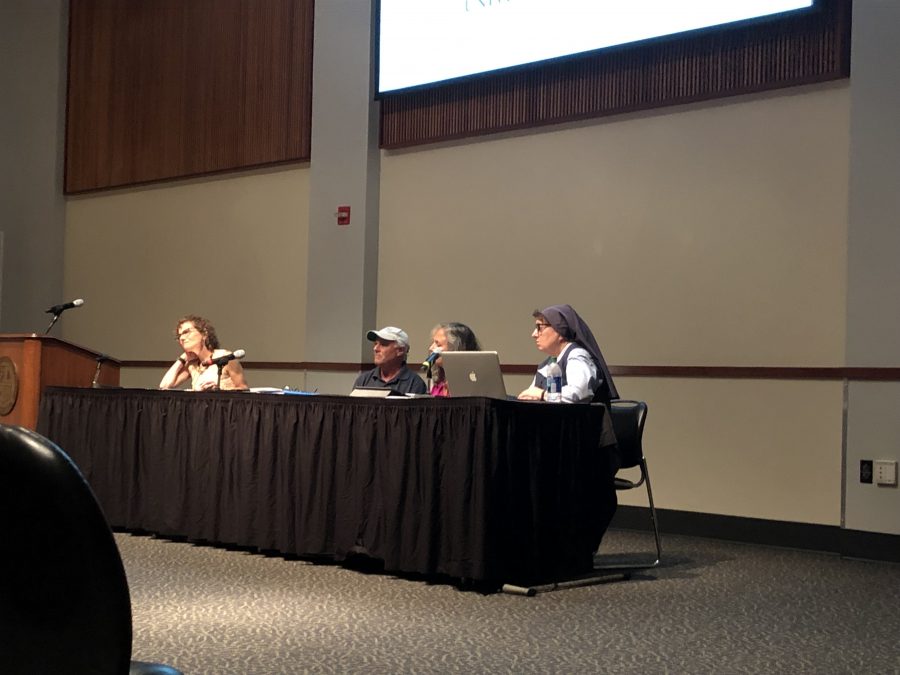On Sept. 25 in the Loyola Notre Dame Library, the department of psychology, the School of Education, and Messina put on a screening of the 2018 documentary “Three Identical Strangers” as part of a “Self and Others” theme-wide event, followed by a panel on Oct. 3 discussing the film.
“Three Identical Strangers” tells the story of triplets David, Robert “Bobby,” and Edward “Eddy,” who were separated at six months by Louise Wise Adoption Agency in 1961. Then, 20 years later by total coincidence, the boys find each other. What starts out as an incredible, happy story of a reunion turns dark when they find out why they were separated to begin with and how such a long separation affected them. Ultimately, the triplets—along with an unknown number of other pairs of twins and triplets—were part of a twin study that evaluated parenting style and nature versus nurture.
Psychology professors Amy Wolfson and Andrew Futterman; Stephanie Flores-Koulish, associate professor of education; and Rose Pacatte, director of the Pauline Center for Media Studies in Los Angeles, moderated the panel hosted on Oct. 3. During the panel, questions of ethics, familial bonds, nature versus nurture, and social relevance were explored, and although the panel accompanied the viewing of “Three Identical Strangers,” it wasn’t necessary to have seen the movie to participate in the conversation.
As someone who was adopted as a baby, panelist Flores-Koulish has a personal connection to identity and adoption and what it means to be separated from a family. Flores-Koulish said, “You’re always wondering what life could’ve been like and who you would’ve—might’ve become. You’re wondering that forever.”
In the film, David and Bobby express similar sentiments after being united but, hit on this subject while speaking about Eddy’s suicide in 1995. In the documentary, Bobby says, “Why Eddy? Why Eddy and why not me?” Would the fate of each triplet be different if they had not been placed with their families and instead with each other’s families? Would Eddy still be alive? Would another triplet be dead, or is it simply nature and not nurture?
Flores-Koulish believes that although nurture affects us, we cannot be separated from our nature. She said, “once I found my biological family, they were much more like me than my adopted family,” explaining how the similarities in her biological family even came down to having the same college degrees and teaching the same subjects. Flores-Koulish went on to say that there is “an irony to nature versus nurture,” and panelist Futterman agreed. Futterman said, “It used to be nurturing nature, not nature versus nurture,” and that “any attempt to separate the inside from the outside will not work.”
Futterman spent the majority of his speaking time discussing the ethical issues involved with the study in “Three Identical Strangers.” The study was conducted by Dr. Peter Neubauer and involved splitting up the boys and sending them to three different families, all with varying socioeconomic statuses and parenting styles. None of the parents were told there was more than one child, and Neubauer conducted the experiment with the intention of never telling the twins/triplets they have siblings. “People have known for a long time that they can’t do things like this,” Futterman said. “This study should not have been done.”
Panelist Rose Pacatte agreed that this study was unethical and that twins may share DNA, but they are different people: “They may be identical twins, but there is no such thing as identical humans—no identical child.” Pacatte tied the empathy and compassion felt toward the non-consensual separation of the triplets to the current social issue of family separation at the US border. “These families want to be together, and they can’t be,” Pacatte said. “There is no record of whose family is whose. What will happen to these children in 20 years?”
Feature Image: Courtesy of Sofia Barr ’20.



















































































































